|
|
|
Sort Order |
|
|
|
Items / Page
|
|
|
|
|
|
|
| Srl | Item |
| 1 |
ID:
153203


|
|
|
|
|
| Publication |
New Delhi, KW Publishers Pvt Ltd, 2017.
|
| Description |
xi, 228p.hbk
|
| Standard Number |
9789386288554
|
|
|
|
|
|
|
|
|
|
|
|
Copies: C:1/I:0,R:0,Q:0
Circulation
| Accession# | Call# | Current Location | Status | Policy | Location |
| 059097 | 305.4209581/GHO 059097 | Main | On Shelf | General | |
|
|
|
|
| 2 |
ID:
188947
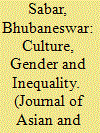

|
|
|
|
|
| Summary/Abstract |
This ethnographic paper explores gender inequality in tribal societies vis-à-vis customary practices and challenges the notion of egalitarianism of tribal society by taking Chuktia Bhunjia tribe of Odisha, India as an analytical category. In the light of a discussion on women specific taboos and restrictions, captured through formal interview, narrative and lived experience approach, the paper explicates the deeply embedded nature of the taboos in Chuktia Bhunjia society and unravels how prohibiting women from socio-economic and religious space, backed by purity-pollution philosophy, perpetuate the gender inequality among them. It was found that although economic division of labour is indistinct; women are perceived being portrayal of misfortunes during perceived pollution periods and are prohibited to enter into sacred places – kitchen room, cowshed, sacred groves and forest – and take part in community festivals and other auspicious occasions. The existing material culture, especially kitchen room, alongside economic structure, self-notion of ‘outsiders’ and apparently fixed customary laws have direct influence on the position of women in this society. It is found that the customary laws are not mere symbolic expressions in perpetuating the gender asymmetry, but have become a powerful tool to patriarchal controls not only over women’s education, health, properties and knowledge, but also over individual’s choice, freedom, decision-making and sexuality. However, internal challenges are reported against customary laws and taboos, the fear of social ostracism, the obligation to restore the purity of cultural entity and anxiety reinforce people to be always submissive to those practices. Therefore, unless there is transformation alongside their culture, it is fruitless to think of gender equality.
|
|
|
|
|
|
|
|
|
|
|
|
|
|
|
|
| 3 |
ID:
162797
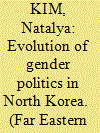

|
|
|
|
|
| Summary/Abstract |
Broader rights and greater opportunities granted to Korean women have been priorities in social policy of North Korea. The liberation of Korea from colonial dependence presented the country's leadership with the task of doing away with semi-feudal holdovers, one of which was female discrimination in family and public life. Equality of the sexes was based on the socialist concept of women's emancipation. After the establishment of juche as the state's ideology in North Korea, the development of rights and duties of women has received a new ideological backing largely based on traditional Korean values.
|
|
|
|
|
|
|
|
|
|
|
|
|
|
|
|
| 4 |
ID:
157765
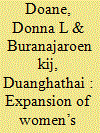

|
|
|
|
|
| Summary/Abstract |
This study examines the political implications of women’s participation in social movements in Thailand. Based on interviews at protest sites and focus group discussions with movement participants as well as interviews with leaders and key informants, the study suggests that political socialization within what is commonly called the color-coded movements has resulted in women acquiring political knowledge and learning about political engagement while being increasingly accepted as competent political actors. Consequently, women have utilized the Red and Yellow Shirt movements to increase their engagement in politics in three different ways. First, women form groups to enhance their political roles and opportunities within the movements. Second, women are expanding their political roles beyond those offered by the color-coded movements by becoming informal representatives, bridging their communities with formal political agents and institutions. Finally, women are increasingly entering into formal politics through the support of their movements.
|
|
|
|
|
|
|
|
|
|
|
|
|
|
|
|
| 5 |
ID:
080666


|
|
|
|
|
| Publication |
2008.
|
| Summary/Abstract |
This essay explores reactions to the 1996-1997 incarceration of R is n McAliskey, a young Irish republican, pregnant at the time of her arrest. The case revealed tensions and contradictions in the politics of gender, national identity, and reconciliation at a tentative stage in the Northern Ireland peace process. Special attention is given to the negotiation of the case by the politically diverse Northern Ireland Women's Coalition and other activists who worked to forge broad-based support campaigns. Along with reactions to them, these efforts were diagnostic of the challenges of developing new politics during this transitional period. These included prospects for new gender-based alliances as well as the potential and the limitations of human rights and political recognition to contribute to projects of reconciliation. For some activist women, the McAliskey case was unsettling to their own sense of political identity, a disruption that may be understood as symptomatic of the intersubjective quality of recognition. It suggests that, although demands for recognition are often most salient in ethnic or nationalist "conflict zones," the dilemmas attached to extending recognition may be especially acute in just such contexts, where both political subjectivity and physical safety have often hinged on avoiding ambiguity. Similarly, human rights are frequently presented as vehicles for peacemaking. When the state's legitimacy is the focus of conflict, however, demands for human rights often appear as attacks on the state and, by implication, those who identify with it.
|
|
|
|
|
|
|
|
|
|
|
|
|
|
|
|
| 6 |
ID:
111677
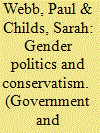

|
|
|
|
|
| Publication |
2012.
|
| Summary/Abstract |
Can conservatives be feminists? This article examines the issue by exploring the case of the British Conservative Party, drawing on a new survey of party members. Under David Cameron's leadership, reforms have been made to the party's parliamentary selection procedures and distinct women's policies developed, thus addressing both the descriptive and substantive representation of women. We examine party members' attitudes towards three types of gender issue: basic orientations towards gender roles and relations; specific policy measures relevant to the substantive representation of women; and the descriptive representation of women. Detailed empirical analysis reveals that there is significant support for progressive liberal feminist positions on each of these dimensions in the party, and that sex, age and basic ideological dispositions drive such attitudes to varying degrees. Even so, support for a liberal feminist position on the descriptive representation of women - that is, the aspect of gender politics where the leadership has been most active - remains on the whole quite limited.
|
|
|
|
|
|
|
|
|
|
|
|
|
|
|
|
| 7 |
ID:
154038
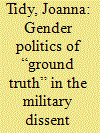

|
|
|
|
|
| Summary/Abstract |
This article analyses the politics of “ground truth,” a premise central to the contemporary military dissent movement in the United States. Ground truth refers to the “truths” about war that soldiers who have experienced its realities can bring to bear on prevailing war narratives in order to disrupt them. The article identifies how the authority of ground truth is bound with accounts of gender and sexuality through which particular understandings of war (principally war as combat and violence) are reproduced. Examination of two prominent dissenting subject positions within the movement, the “(anti)war hero” and the “peace mom,” suggests that authority to oppose war is organized around the hegemonic military masculine figure of the warrior hero. Potentially more unruly war experiences, such as those of non-combat military personnel, remain obscured. I explore what perspectives and understandings of war might be revealed if we consider non-combat personnel as actively engaged in, and experiencing, war and discuss implications for dissent. The article therefore addresses how gendered power structures the ways in which war is known, understood, and also opposed through authenticity-based authority claims.
|
|
|
|
|
|
|
|
|
|
|
|
|
|
|
|
| 8 |
ID:
138985
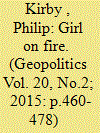

|
|
|
|
|
| Summary/Abstract |
This paper explores the gender politics of the ‘Hunger Games’ film series. It suggests that the lead character of the series, Katniss Everdeen, represents a progressive portrayal of the female action hero, contrary to much Hollywood fare. Theoretically and methodologically, the paper approaches the series through the rubric of ‘popular geopolitics 2.0ʹ and suggests that, within this, opportunities exist for further alignment between feminist geopolitics and popular geopolitics. To support its analysis, the paper offers a critical review of coverage of the series on feminist online media. The paper finishes by assessing the progressive potential of the series, as well as future directions for feminist and popular geopolitics.
|
|
|
|
|
|
|
|
|
|
|
|
|
|
|
|
| 9 |
ID:
111959
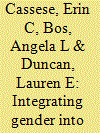

|
|
|
|
|
| Publication |
2012.
|
| Summary/Abstract |
The New Research on Gender in Political Psychology Conference brought together new and experienced teachers with interests in gender politics. The conference session "Teaching Gender throughout the Curriculum" generated a great deal of discussion concerning the pedagogical practice of gender mainstreaming. Gender mainstreaming-the integration of gendered content into courses required for a major-was recognized as one of 11 recommendations for reforming the undergraduate political science curriculum in the 1991 APSA report "Liberal Learning an The Political Science Major: A Report to the Profession" (popularly referred to as the Wahlke Report). Little information is available on the prevalence of gender courses in the undergraduate curriculum, but the data that does exist suggest such courses are uncommon (Brandes et al. 2001). We found virtually no data on the practice of gender mainstreaming in political science and little data in the way of assessing the impact of gendered content when students are exposed to it. This absence of data suggests gender mainstreaming has not emerged as a serious priority for curricular reform.
|
|
|
|
|
|
|
|
|
|
|
|
|
|
|
|
| 10 |
ID:
077756


|
|
|
|
|
| Publication |
2007.
|
| Summary/Abstract |
The 1979 UN Convention on the Elimination of all Forms of Discrimination against Women highlights the importance of equal participation of women in public life. Since the early 1960s, women in Japan have voted in elections at significantly higher rates than men. However, Japanese women's equal participation in policy formulation and decision making lags far behind major democracies. Gender equality is stated under the Japanese Constitution, but social practices are far from equal. There are no legal constraints on Japanese women's right to candidacy for public office, but they are far underrepresented in local and national elected assemblies. In 1999 an important landmark in the substantial progress towards gender equality took place when the Japanese government, for the first time, legally denounced the stereotyped division of roles on the basis of gender and described men and women as equal partners. An unprecedented amount of legislation, together with policy changes and organizational reform at the national level were introduced from this state-led initiation. In the same year, women's grassroots groups were rapidly moving beyond the reach of policy, organizational, and legal changes; they successfully conducted a major nationwide campaign for 'More Women to Assemblies¡' and increased the number of elected women representatives at the local level at an unprecedented rate. The purpose of this article is to assess the potential of increased women's political voices in Japan, which can be seen as an alternative way of solving the problems of political disengagement in the male-dominated representative democracy. To this end, the article examines the course of watershed events in 1999 towards a gender-equal society in Japan, with special emphasis on the importance of grassroots missions in eliminating barriers to Japanese women's political participation
|
|
|
|
|
|
|
|
|
|
|
|
|
|
|
|
| 11 |
ID:
097447


|
|
|
| 12 |
ID:
179905
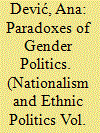

|
|
|
|
|
| Summary/Abstract |
The article maps the positioning of women in the right-wing nationalist politics in Serbia, as well as the place of gender (equality) in the programs of these right-wing and other political parties. The grand frame of all right-wing groupings in Serbia is three-fold: (1) the collapse of the Yugoslav state and socialist regime; (2) the ethnonationalist frames of extreme wartime violence, which conditioned the Serbian postsocialist “transition”; and (3) the repatriarchalization of society and politics that resulted from the first two processes. The positioning of women in the New Right in Serbia will be explained by the context of the following processes: (a) nationalism and related historical revisionism that justifies the wars of the 1990s and their lasting unsettled aftermath, including the frozen conflict in Bosnia-Herzegovina and the unresolved status of Kosovo; (b) the transformation of Serbia from rogue state in the 1990s to the Europe-and-globally-friendly state; and (c) the globalization of the New Right, where the prominence of token women in leadership positions confuses their individual mobility with the broader goals of women’s solidarity, anti-discrimination struggle, and feminism.
|
|
|
|
|
|
|
|
|
|
|
|
|
|
|
|
| 13 |
ID:
193023
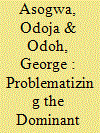

|
|
|
|
|
| Summary/Abstract |
This study examines how the lives of three women, Lọlọ Ọyịodo Eze Elugwu, Lọlọ Ọyịma Ezema, and Lọlọ Ọyima Ayọgụ from Nsukka Igbo, southeast Nigeria, challenge widespread assumptions on women’s involvement in Igbo masking traditions. Although the uncommon achievements of these women do not completely dismantle existing beliefs and assumptions that view Igbo masquerade activities as the exclusive preserve of men, the study highlights how their roles as initiates of the Omabe masquerade cult, as well as their capacities to commission, own and animate masks, problematize notions of gender, power and spaces in Igbo masquerade institution. It equally opens up a critical space for interrogating women’s positions and roles in Igbo masquerade institution and establishes grounds for re-appraising its essence and gendering politics.
|
|
|
|
|
|
|
|
|
|
|
|
|
|
|
|
| 14 |
ID:
133934
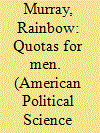

|
|
|
|
|
| Publication |
2014.
|
| Summary/Abstract |
Gender quotas traditionally focus on the underrepresentation of women. Conceiving of quotas in this way perpetuates the status of men as the norm and women as the "other." Women are subject to heavy scrutiny of their qualifications and competence, whereas men's credentials go unchallenged. This article calls for a normative shift in the problem of overrepresentation, arguing that the quality of representation is negatively affected by having too large a group drawn from too narrow a talent pool. Curbing overrepresentation through ceiling quotas for men offers three core benefits. First, it promotes meritocracy by ensuring the proper scrutiny of politicians of both sexes. Second, it provides an impetus for improving the criteria used to select and evaluate politicians. Third, neutralizing the overly masculinized environment within parliaments might facilitate better substantive and symbolic representation of both men and women. All citizens would benefit from these measures to increase the quality of representation.
|
|
|
|
|
|
|
|
|
|
|
|
|
|
|
|
| 15 |
ID:
149543
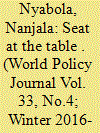

|
|
|
|
|
| Summary/Abstract |
For women across the world, electoral politics can be a hostile and violent place. Writer Nanjala Nyabola investigates the parliamentary quota systems in East Africa, demonstrating how well they can work when supported with institutional will and how resoundingly they can fail when the patriarchy conspires to undo them.
|
|
|
|
|
|
|
|
|
|
|
|
|
|
|
|
| 16 |
ID:
126987
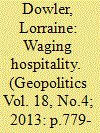

|
|
|
|
|
| Publication |
2013.
|
| Summary/Abstract |
Many areas of Belfast were considered no-go areas, places where the police had lost jurisdiction, whilst the media designated these neighbourhoods as terrorist enclaves. The urban scars that remain after the signing of the peace agreement, have transformed these marginalised areas into places of hospitality for tourists curious about the past conflict. This paper highlights the interdependent relationship between hospitality and the development of a post-war confidence for a community that had long been stigmatised as a violent enclave. For the purpose of this paper I bring together a feminist geopolitical analysis, with its attention to daily life, with more recent feminist theories of hospitality, observant to issues of inclusiveness. A feminist analysis of this type not only reflects the complicated gender politics of West Belfast, but also exposes a "politics of hospitality" that helps reframe our understandings of security.
|
|
|
|
|
|
|
|
|
|
|
|
|
|
|
|
| 17 |
ID:
137150
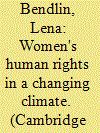

|
|
|
|
|
| Summary/Abstract |
A women's rights perspective can inform and structure research on climate policy impacts on women. To date, climate policy analysis has mostly considered women as agents of climate protection, that is, objects of mitigation policies, rather than subjects in their own right. However, climate change mitigation involves direct and indirect distributive effects depending on which sectors are involved, which instruments are chosen and how funds are obtained and allocated. Since gender roles impact on individual livelihoods and activities, distributive effects are likely to be gendered. This paper suggests that women's human rights can be used as a framework for research aiming to fill this gap. They provide a well-developed, tested range of criteria for gender justice. Such assessments would allow for a more systematic and comprehensive understanding of the gendered distributive effects of climate policies, notably with regard to the particularly understudied situation in the industrialized world.
|
|
|
|
|
|
|
|
|
|
|
|
|
|
|
|
|
|
|
|
|